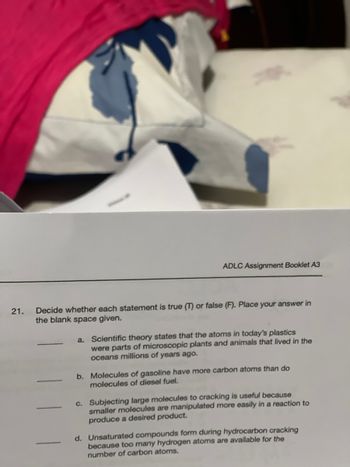
Chemistry
10th Edition
ISBN: 9781305957404
Author: Steven S. Zumdahl, Susan A. Zumdahl, Donald J. DeCoste
Publisher: Cengage Learning
expand_more
expand_more
format_list_bulleted
Concept explainers
Question
thumb_up100%

Transcribed Image Text:21.
ADLC Assignment Booklet A3
Decide whether each statement is true (T) or false (F). Place your answer in
the blank space given.
Scientific theory states that the atoms in today's plastics
were parts of microscopic plants and animals that lived in the
oceans millions of years ago.
b. Molecules of gasoline have more carbon atoms than do
molecules of diesel fuel.
c. Subjecting large molecules to cracking is useful because
smaller molecules are manipulated more easily in a reaction to
produce a desired product.
d. Unsaturated compounds form during hydrocarbon cracking
because too many hydrogen atoms are available for the
number of carbon atoms.
Expert Solution
This question has been solved!
Explore an expertly crafted, step-by-step solution for a thorough understanding of key concepts.
Step by stepSolved in 4 steps

Knowledge Booster
Learn more about
Need a deep-dive on the concept behind this application? Look no further. Learn more about this topic, chemistry and related others by exploring similar questions and additional content below.Similar questions
- What is the molar mass of oxygen (O2)? A. 1.204x1024 g/mol B.6.02x1023 g/mol C.15.9994 g/mol D. 31.9988 g/mol 2. Answer the question below. Use the rubric in the materials for help if needed. What is the molar mass of Ca3(PO4)2?Show all your work. 3. How many atoms of sodium do you have if you have one mole of sodium? A. 1 atom of sodium B. 6.02x1023 of sodium C. 6 atoms of sodium D. 6.02x1032 atoms of sodiumarrow_forwardThere are 1.5 x 1022 atoms in A. 0.025 mol of gold B. 4.0 g of helium C. 2.5 x 1044 moles of copper D. 1.0 kg of silverarrow_forward2. For Exp 5: a. Write the balanced chemical equation for the reaction between Magnesium and oxygen. b. Explain the difference between empirical formula and molecular formula 10 19 tv MacBook Air 80 000 000 DII F3 F4 F5 F6 F7 F8arrow_forward
- . If 21.4 g of aluminum is reacted with 91.3 g of Fe2O3, the prodücts will be Al2O3 and iron. What mass of iron will be produced?arrow_forwardWhat mass of sulfur dioxide, SO2, would contain the same mass of oxygen as is contained in 33.7g of arsenic pentoxide, As205? O A. 23.5 g O B. 32.5 g O C. 53.2 g O D. 35.2 g O E. 53.2 garrow_forward4. When 10.0g of ice melts into water, how many grams of water are produced? CS Scanned with Camscanemanyarrow_forward
- What is the mass of oxygen atoms in 0.305 moles of Fe(CO)5 ?A. 17.0 gB. 59.7 gC. 24.4 gD. 4.88 garrow_forwardLet’s put the above values into the formula: V1 = 8.00 mol.L-1 × 2.42 L13.0 mol.L-1V1 = 8.00 mol.L-1 × 2.42 L13.0 mol.L-1V1 = 8.00 × 2.42 L13.0V1 = 1.4892 LV1 = 1.49 L This part is little confusingarrow_forwardSagar.muliyaarrow_forward
arrow_back_ios
SEE MORE QUESTIONS
arrow_forward_ios
Recommended textbooks for you
 ChemistryChemistryISBN:9781305957404Author:Steven S. Zumdahl, Susan A. Zumdahl, Donald J. DeCostePublisher:Cengage Learning
ChemistryChemistryISBN:9781305957404Author:Steven S. Zumdahl, Susan A. Zumdahl, Donald J. DeCostePublisher:Cengage Learning ChemistryChemistryISBN:9781259911156Author:Raymond Chang Dr., Jason Overby ProfessorPublisher:McGraw-Hill Education
ChemistryChemistryISBN:9781259911156Author:Raymond Chang Dr., Jason Overby ProfessorPublisher:McGraw-Hill Education Principles of Instrumental AnalysisChemistryISBN:9781305577213Author:Douglas A. Skoog, F. James Holler, Stanley R. CrouchPublisher:Cengage Learning
Principles of Instrumental AnalysisChemistryISBN:9781305577213Author:Douglas A. Skoog, F. James Holler, Stanley R. CrouchPublisher:Cengage Learning Organic ChemistryChemistryISBN:9780078021558Author:Janice Gorzynski Smith Dr.Publisher:McGraw-Hill Education
Organic ChemistryChemistryISBN:9780078021558Author:Janice Gorzynski Smith Dr.Publisher:McGraw-Hill Education Chemistry: Principles and ReactionsChemistryISBN:9781305079373Author:William L. Masterton, Cecile N. HurleyPublisher:Cengage Learning
Chemistry: Principles and ReactionsChemistryISBN:9781305079373Author:William L. Masterton, Cecile N. HurleyPublisher:Cengage Learning Elementary Principles of Chemical Processes, Bind...ChemistryISBN:9781118431221Author:Richard M. Felder, Ronald W. Rousseau, Lisa G. BullardPublisher:WILEY
Elementary Principles of Chemical Processes, Bind...ChemistryISBN:9781118431221Author:Richard M. Felder, Ronald W. Rousseau, Lisa G. BullardPublisher:WILEY

Chemistry
Chemistry
ISBN:9781305957404
Author:Steven S. Zumdahl, Susan A. Zumdahl, Donald J. DeCoste
Publisher:Cengage Learning

Chemistry
Chemistry
ISBN:9781259911156
Author:Raymond Chang Dr., Jason Overby Professor
Publisher:McGraw-Hill Education

Principles of Instrumental Analysis
Chemistry
ISBN:9781305577213
Author:Douglas A. Skoog, F. James Holler, Stanley R. Crouch
Publisher:Cengage Learning

Organic Chemistry
Chemistry
ISBN:9780078021558
Author:Janice Gorzynski Smith Dr.
Publisher:McGraw-Hill Education

Chemistry: Principles and Reactions
Chemistry
ISBN:9781305079373
Author:William L. Masterton, Cecile N. Hurley
Publisher:Cengage Learning

Elementary Principles of Chemical Processes, Bind...
Chemistry
ISBN:9781118431221
Author:Richard M. Felder, Ronald W. Rousseau, Lisa G. Bullard
Publisher:WILEY